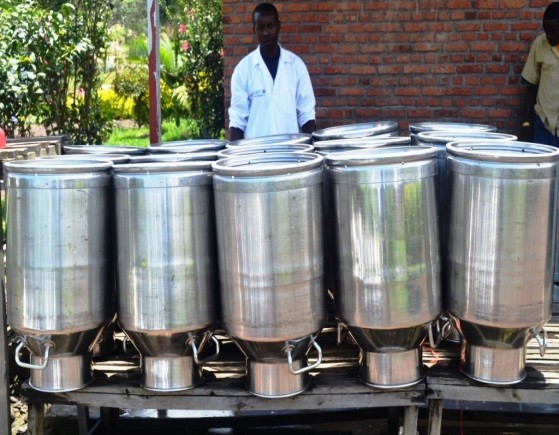
Improving the quality of a perishable good that spoils quickly, like milk, requires a few key inputs. Dairy farmers need disease-resistant livestock, clean hands, rapid product transport, hygienic processing, and adequately refrigerated distribution centers.
Throughout Rwanda, In districts like Rubavu, this process does not come easily. While agriculture accounts for 33 percent of Rwanda’s GDP, the dairy sector only makes up a small portion. If the sector begins to produce at its full quantity and quality potential, it could transform the lives of many rural Rwandans and their families.
Bosco Musafiri is the manager of Kivu Dairy in Rubavu. His company participates in USAID’s Rwanda Dairy Competitiveness Program II. Implemented by Land O’Lakes International Development, the project is designed to address these issues in the dairy sector by integrating various players throughout the value chain—from farmers to consumers.
Launched in early 2012, the project has provided Seal of Quality kits to 31 dairy cooperatives and five milk processors across Rwanda. These kits give dairy cooperatives and processors everything they need to test the safety and quality of the milk from each farmer.
“The project has enormously boosted our dairy business,” said Musafiri. “The kits brought us new and better technology to help differentiate the grades of milk.”
In Rwanda, four grades divide the formal milk market. Grades 1 and 2 contain low bacteria counts. Grade 3 and the lowest grade—"Not Acceptable"—contain levels that can cause serious illness or death to consumers. Informal kiosks, which are Kivu’s main competitors in the market, often offer Grade 3 milk or lower. Despite the low grade, between 85 and 95 percent of Rwandan milk drinkers still shop at kiosks because impurities are often not detected visually.
“Now, we offer price-based incentives to encourage farmers to deliver high quality milk, which attains a higher price for the farmer,” says Musafiri.
Although the Rwanda Dairy Competitiveness Program II has only been active for two years, current outcomes are promising. Daily collected milk volume has increased 50 percent, from 800 to 1,200 liters. The improvements in milk quality and quantity gave Inyange Industries, Rwanda’s largest milk buyer, the confidence to contract with Kivu Dairy to supply 1,500 liters of clean milk daily, providing a welcome and worthwhile income boost for Kivu’s milk suppliers.







Comment
Make a general inquiry or suggest an improvement.